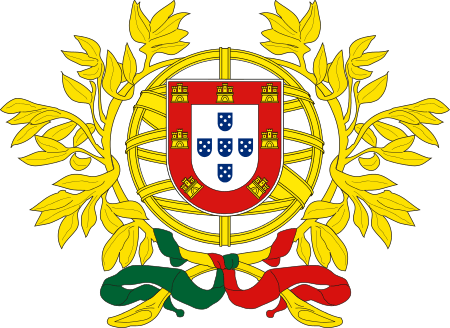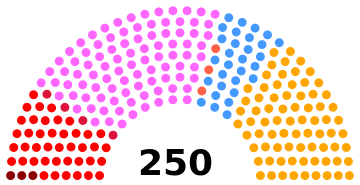1983 Portuguese legislative election
The Portuguese legislative election of 1983 took place on 25 April. The last election, in October 1980 had been won by a right-wing coalition, the Democratic Alliance and Francisco Sá Carneiro had retained office as Prime Minister with an increased majority.
| ||||||||||||||||||||||||||||||||||||||||||||||||||||||||||||||||||||||||||
250 seats to the Portuguese Assembly 125 seats needed for a majority | ||||||||||||||||||||||||||||||||||||||||||||||||||||||||||||||||||||||||||
|---|---|---|---|---|---|---|---|---|---|---|---|---|---|---|---|---|---|---|---|---|---|---|---|---|---|---|---|---|---|---|---|---|---|---|---|---|---|---|---|---|---|---|---|---|---|---|---|---|---|---|---|---|---|---|---|---|---|---|---|---|---|---|---|---|---|---|---|---|---|---|---|---|---|---|
| Registered | 7,337,064 | |||||||||||||||||||||||||||||||||||||||||||||||||||||||||||||||||||||||||
| Turnout | 5,707,695 (77.8%) | |||||||||||||||||||||||||||||||||||||||||||||||||||||||||||||||||||||||||
| ||||||||||||||||||||||||||||||||||||||||||||||||||||||||||||||||||||||||||
 Results by district or autonomous region. | ||||||||||||||||||||||||||||||||||||||||||||||||||||||||||||||||||||||||||
| ||||||||||||||||||||||||||||||||||||||||||||||||||||||||||||||||||||||||||
| This article is part of the series: |
| Politics and government of Portugal |
|---|
 |
| Portugal |
However, Sá Carneiro, along with other important members of the coalition, died in an aircrash only two months after the election, on 5 December 1980. Such happenings caused a massive political instability and Francisco Pinto Balsemão, a senior official of the Social Democratic Party, the largest party in the Alliance, became Prime Minister. But Balsemão lacked support from such senior members of his party as Aníbal Cavaco Silva, and several ministers resigned. Moreover, the right-wing policy was criticized by the left-wing and by the trade unions, and in February, the General Confederation of the Portuguese Workers, with the support of the Communists, called for a general strike that shook the government. The wave of resignations among Balsemão's ministers continued and by the end of the year, he also resigned. Because no one inside the Social Democratic Party accepted the office of Prime Minister, the President Ramalho Eanes dissolved the Parliament and called an election for April.
The election was won by the Socialist Party with 36%, and Mário Soares was nominated Prime Minister. However, the Socialists lacked a majority in the Assembly of the Republic and were forced to form a coalition with the Social Democrats, which achieved 27%, in what was called the "Central Block". Although this coalition allowed Soares to govern, several members of both parties were against it, and internal attacks led to the collapse of the coalition after less than two years. In the election that followed, the Communist-dominated United People Alliance lost 3 MPs and the Democratic and Social Center, after the dissolution of the Democratic Alliance, was now alone in the Parliament with 30 MPs, a loss of 16. The election marked the beginning of a process of bi-polarization of Portuguese politics.
This was the last legislative election to be won by the Socialist Party until 1995.
Electoral system
The Assembly of the Republic has 250 members elected to four-year terms. Governments do not require absolute majority support of the Assembly to hold office, as even if the number of opposers of government is larger than that of the supporters, the number of opposers still needs to be equal or greater than 126 (absolute majority) for both the Government's Programme to be rejected or for a motion of no confidence to be approved.[3]
The number of seats assigned to each district depends on the district magnitude.[4] The use of the d'Hondt method makes for a higher effective threshold than certain other allocation methods such as the Hare quota or Sainte-Laguë method, which are more generous to small parties.[5]
Parties
The major parties involved and the respective leaders:
- United People Alliance (APU), Álvaro Cunhal
- Socialist Party (PS), Mário Soares
- Social Democratic Party (PSD), Mota Pinto
- Democratic and Social Center (CDS), Lucas Pires
Mário Soares, leader of the Socialist Party, was nominated Prime Minister.
Campaign period
Party slogans
| Party or alliance | Original slogan | English translation | Refs | |
|---|---|---|---|---|
| PSD | « Firmeza na decisão. Competência na acção. » | "Firmness in the decision. Competence in action." | [6] | |
| PS | « Juntos vamos conseguir » | "Together we will do it" | [7] | |
| CDS | « O nosso caminho é Portugal » | "Our path is Portugal" | [8] | |
| APU | « Vota APU, A solução! » | "Vote APU, The Solution!" | [9] | |
National summary of votes and seats
 | ||||||||||
| Parties | Votes | % | ± | Seats | MPs %/ votes % | |||||
|---|---|---|---|---|---|---|---|---|---|---|
| 1980 | 1983 | ± | % | ± | ||||||
| Socialist[A] | 2,061,309 | 36.11 | 741 | 101 | 40.40 | 1.12 | ||||
| Social Democratic[B] | 1,554,804 | 27.24 | N/A | 82 | 75 | 30.00 | 1.10 | |||
| United People Alliance[C] | 1,031,609 | 18.07 | 41 | 44 | 17.60 | 0.97 | ||||
| Democratic and Social Centre[B] | 716,705 | 12.56 | N/A | 46 | 30 | 12.00 | 0.96 | |||
| Christian Democratic | 39,180 | 0.69 | N/A | N/A | 0 | N/A | 0.00 | N/A | 0.0 | |
| People's Monarchist[B] | 27,635 | 0.48 | N/A | 6 | 0 | 0.00 | 0.0 | |||
| People's Democratic Union | 27,260 | 0.48 | 1 | 0 | 0.00 | 0.0 | ||||
| People's Democratic Union / PSR | 25,222 | 0.44 | N/A | N/A | 0 | N/A | 0.00 | N/A | 0.0 | |
| Portuguese Workers' Communist | 20,995 | 0.37 | 0 | 0 | 0.00 | 0.0 | ||||
| Workers Party of Socialist Unity | 19,657 | 0.34 | 0 | 0 | 0.00 | 0.0 | ||||
| Revolutionary Socialist | 13,327 | 0.23 | 0 | 0 | 0.00 | 0.0 | ||||
| Socialist Workers League | 11,500 | 0.20 | N/A | N/A | 0 | N/A | 0.00 | N/A | 0.0 | |
| OCMLP | 6,113 | 0.11 | 0 | 0 | 0.00 | 0.0 | ||||
| Democratic Party of the Atlantic | 5,523 | 0.10 | 0 | 0 | 0.00 | 0.0 | ||||
| Communist Party (Reconstructed)[D] | 86 | 0.00 | N/A | N/A | 0 | N/A | 0.00 | N/A | 0.0 | |
| Total valid | 5,561,011 | 97.43 | 250 | 250 | 100.00 | — | ||||
| Blank ballots | 42,494 | 0.74 | ||||||||
| Invalid ballots | 104,276 | 1.83 | ||||||||
| Total (turnout 77.79%) | 5,707,695 | 100.00 | ||||||||
| A The Socialist Party contested the 1980 election in a coalition (Republican and Socialist Front). B The Social Democratic Party, the Democratic and Social Centre and the People's Monarchist Party contested, together, the 1980 election in a coalition (Democratic Alliance). C Portuguese Communist Party (41 MPs) and Portuguese Democratic Movement (3 MPs) ran in coalition.[12] D Communist Party (Reconstructed) list only in Europe and Rest of the World. | ||||||||||
| Source: Comissão Nacional de Eleições, Mapa oficial. D.R. n.º 121, Suplemento, Série I de 1983-05-26 | ||||||||||
1 Socialist Party results are compared to the combined totals of the Republican and Socialist Front in the 1980 election.
Distribution by constituency
| Constituency | % | S | % | S | % | S | % | S | Total S |
|---|---|---|---|---|---|---|---|---|---|
| PS | PSD | APU | CDS | ||||||
| Azores | 31.1 | 2 | 54.4 | 3 | 3.1 | - | 4.7 | - | 5 |
| Aveiro | 36.6 | 6 | 34.8 | 6 | 7.0 | 1 | 16.4 | 2 | 15 |
| Beja | 28.0 | 2 | 11.8 | - | 49.4 | 3 | 4.1 | - | 5 |
| Braga | 39.7 | 7 | 27.0 | 5 | 8.8 | 1 | 18.3 | 3 | 16 |
| Bragança | 30.4 | 1 | 35.8 | 2 | 4.8 | - | 20.9 | 1 | 4 |
| Castelo Branco | 37.1 | 3 | 30.6 | 2 | 11.3 | - | 13.2 | 1 | 6 |
| Coimbra | 45.3 | 6 | 27.8 | 3 | 10.7 | 1 | 10.2 | 1 | 11 |
| Évora | 23.9 | 1 | 18.6 | 1 | 47.6 | 3 | 4.5 | - | 5 |
| Faro | 43.2 | 5 | 23.1 | 2 | 18.6 | 2 | 7.4 | - | 9 |
| Guarda | 33.5 | 2 | 31.5 | 2 | 4.9 | - | 23.8 | 1 | 5 |
| Leiria | 32.7 | 4 | 35.6 | 4 | 9.5 | 1 | 16.2 | 2 | 11 |
| Lisbon | 35.8 | 21 | 21.8 | 13 | 25.3 | 15 | 11.7 | 7 | 56 |
| Madeira | 24.4 | 1 | 56.2 | 4 | 2.8 | - | 8.2 | - | 5 |
| Portalegre | 38.5 | 2 | 19.1 | 1 | 28.7 | 1 | 7.5 | - | 4 |
| Porto | 43.0 | 18 | 26.2 | 10 | 13.6 | 5 | 12.5 | 5 | 38 |
| Santarém | 38.4 | 5 | 24.7 | 3 | 20.0 | 3 | 10.0 | 1 | 12 |
| Setúbal | 30.6 | 6 | 12.7 | 2 | 45.8 | 8 | 5.1 | 1 | 17 |
| Viana do Castelo | 32.5 | 2 | 32.6 | 3 | 9.9 | - | 18.4 | 1 | 6 |
| Vila Real | 32.3 | 2 | 42.0 | 3 | 5.4 | - | 12.7 | 1 | 6 |
| Viseu | 30.9 | 4 | 36.6 | 4 | 4.6 | - | 20.7 | 2 | 10 |
| Europe | 33.6 | 1 | 31.2 | 1 | 17.1 | - | 11.1 | - | 2 |
| Rest of the World | 7.0 | - | 48.2 | 1 | 2.8 | - | 34.1 | 1 | 2 |
| Total | 36.1 | 101 | 27.2 | 75 | 18.1 | 44 | 12.6 | 30 | 250 |
| Source: Comissão Nacional de Eleições | |||||||||
Maps
.png) Most voted political force by municipality.
Most voted political force by municipality.
Notes
- The Social Democratic Party (PSD), the Democratic Social Center (CDS) and the People's Monarchist Party (PPM) contested the 1980 election in a coalition called Democratic Alliance (AD) and won a combined 47.6% of the vote and elected 134 MP's to parliament.
References
- Fundação Mário Soares
- Diário da Républica, 26 de Maio de 1983 - Lista de candidatos eleitos
- "Constitution of the Portuguese Republic" (PDF). Archived from the original (PDF) on 2016-03-03. Retrieved 2019-12-29.
- "Effective threshold in electoral systems". Trinity College, Dublin. Retrieved 2015-10-21.
- Gallaher, Michael (1992). "Comparing Proportional Representation Electoral Systems: Quotas, Thresholds, Paradoxes and Majorities"
- "ELEIÇÕES LEGISLATIVAS DE 1983 – PSD". EPHEMERA (in Portuguese). Retrieved 11 May 2020.
- "Evolução da Comunicação Política e Eleitoral em Portugal" (in Portuguese). Retrieved 11 May 2020.
- "ELEIÇÕES LEGISLATIVAS DE 1985 – CDS". EPHEMERA (in Portuguese). Retrieved 11 May 2020.
- "Comunicação Política em eleições legislativas em Portugal: uma análise a partir dos cartazes eleitorais (1975-2009)" (PDF). Francisco Teixeira (in Portuguese). Retrieved 11 May 2020.
- "Debate entre líderes partidários na RDP". RTP (in Portuguese). 1983. Retrieved 11 May 2020.
- "Corpo a corpo esta noite na RTP". Fundação Mário Soares (in Portuguese). 1983. Retrieved 11 May 2020.
- "Electoral results - Assembly of the Republic". Archived from the original on 2012-07-16. Retrieved 2012-09-02.
.jpg)

.jpg)